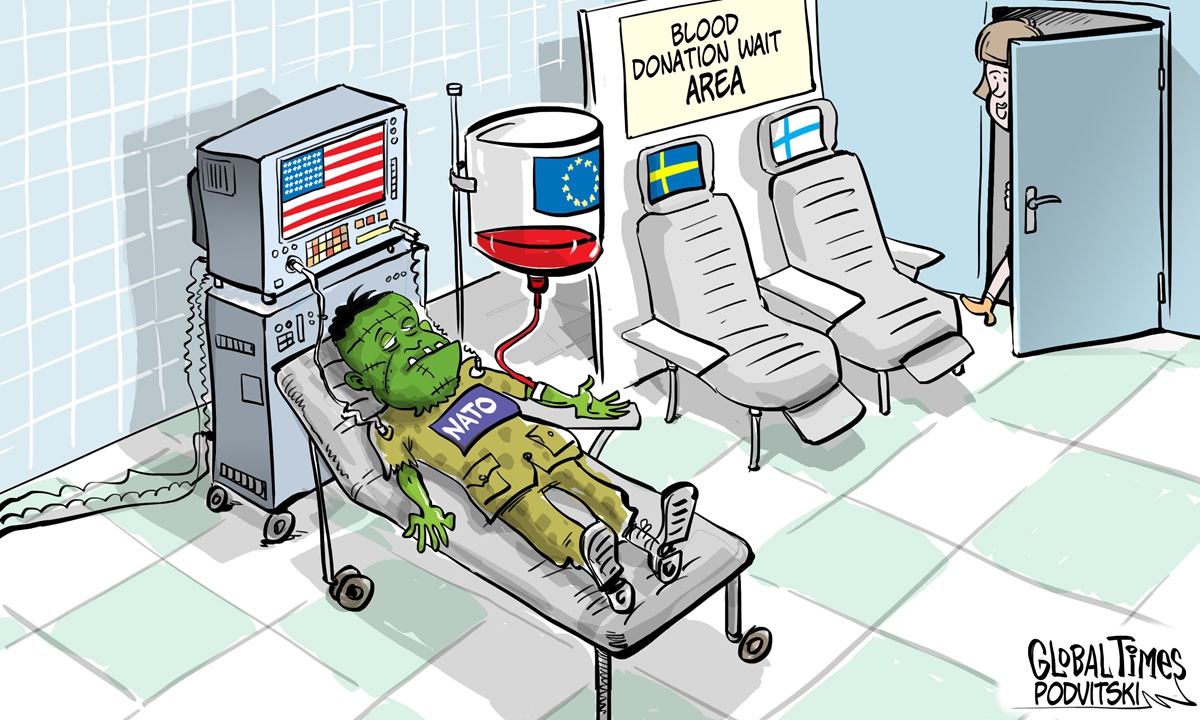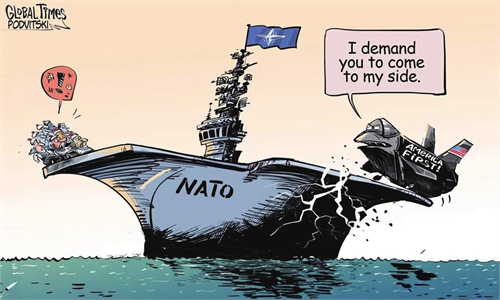
Cartoon: Vitaly Podvitski
Not surprisingly, Turkey on Tuesday lifted its veto of Finland and Sweden's bid to join NATO after the three countries signed an agreement. In his speech after arriving in Madrid for the NATO Summit, US President Joe Biden stressed the unity of the organization, saying NATO was "as galvanized as I believe it's ever been."
The accession of these two neutral countries to NATO will increase the organization's membership to 32 countries. NATO was never meant to be a so-called regional security organization, but rather an aggressive military bloc and political instrument set up in Europe to help maintain US global hegemony.
Despite what the US would like, Europe essentially believes that NATO should be a defensive group of its own security. In American hands, NATO is the spear; in European eyes, it should serve as the shield. As NATO continues to expand, the gradually exposed differences in the interests of NATO members will result in more disputes and conflicts within the alliance.
And the expansion raises the problem of a security dilemma, in which the uneasiness of NATO's neighbor countries increases, in turn leading the entire region and even the world into an arms race and seriously changing the geopolitical landscape. Mistrust and the risk of war are on the rise, making the region and the world less secure. Song Zhongping, a Chinese military expert and TV commentator, told the Global Times that NATO is just an outdated Cold War organization that has long lost its so-called unity or cohesion.
The U-turn in Turkey's attitude was due to a deal that was more satisfactory to all parties. Turkey wants to receive assurances that the Nordic countries were willing to address support for the Kurdish groups Turkey designates as terrorist organizations, in particular the Kurdistan Workers' Party. And the memorandum says Finland and Sweden "extend their full support to Turkey against threats to its national security," making sure they will not provide support to those groups. The Nordic countries also affirmed there were no national arms embargoes relating to Turkey, and the three countries would work together on extradition requests.
According to Song, this is a huge victory for Turkey, which has been demanding major power status since Turkish President Tayyip Erdogan came to power. And it can even be said that Turkey is the only winner in Finland and Sweden's accession to NATO. "Turkey confirms that it has a voice in NATO, while the two Nordic countries are more insecure after joining the alliance," Song noted.
Erdogan achieved his political goals with this move, and the fact that NATO is internally scattered has come to the fore. The divisions within NATO grow as more countries are dragged in. The US hopes to bridge the divisions within NATO, but it's difficult to cater to all needs.
On the issue of the Russia-Ukraine conflict alone, there are different demands among Western countries, as Germany, France and Italy want to stop the war as soon as possible, and the US is calling on all NATO countries to make a common cause against Russia. Wang Shuo, a professor at the School of International Relations of Beijing Foreign Studies University, believes that in this situation, many European countries are questioning whether NATO can solve the crisis in Ukraine. If it cannot work, what's the point of NATO's existence? At the moment when Europeans believe that NATO needs to play a role, it proved itself disunited and incompetent, another sign of NATO's existential crisis.
Russia will probably have to swallow the bitter fruit - NATO's further expansion. But the two Nordic countries' joining NATO is a provocation and humiliation to Russia, and new enmity will be deeply sowed. Europe will not become safer with this significant expansion.
Wang pointed out that joining NATO is like buying medical insurance for serious illnesses, which is a psychological comfort for many European countries: the insurance may be useful, but everyone wants to avoid it coming in handy. Joining NATO is not a no-cost benefit; countries may be "extorted" by NATO, the "insurance company," as the latter brings far more trouble than benefits.
Whether it is the hype of the "Russia threat" or the emphasis of the agreement between Turkey and the two Nordic countries, it has nothing to do with the so-called "unity" of NATO, but only a life-saving straw to prolong NATO's life.

